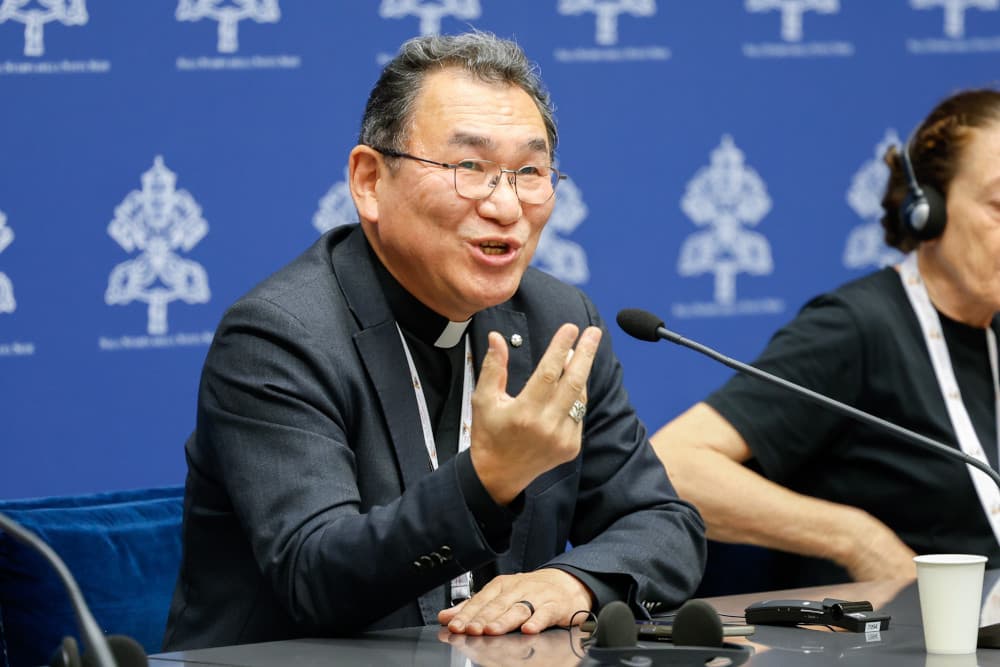MUMBAI, India – Climate change, deforestation, pollution, and loss of biodiversity is a “stark reminder of the urgent need for collective action to protect and preserve our planet for future generations,” according to Japanese Archbishop Isao Kikuchi of Tokyo, the head of Caritas Internationalis.
Speaking at the Caritas Asia Partners Conference in Bangkok, Thailand, on June 12, Kikuchi said the cry of the poor, “expressed through poverty, inequality, displacement, and marginalization, calls us to address the root causes of human suffering and to build societies that are more just, equitable, and inclusive.”
Speaking to Crux, the archbishop said climate change “is not fictional talk but reality of the people in Asia especially people in socially challenging situation and in poverty, that is common understanding of both donor side and receiving side of Caritas members and that is why we have to pay respect to partnership principle of Caritas and that is in fact synodality.”
In his speech, he noted many countries in Asia are already struggling with a multitude of environmental challenges.
“For example, Indonesia, renowned for its biodiversity, faces significant threats from deforestation, especially in regions like Sumatra and Kalimantan,” Kikuchi said.
“In India, a diverse array of environmental issues confronts the nation. Deforestation due to urbanization and agricultural expansion poses a threat to habitats, the condition of air and water is also challenging and endangering aquatic ecosystems and human health,” he continued.
“In Bangladesh, a range of environmental challenges, including deforestation, pollution, and vulnerability to climate change carve scars upon the earth, posing risks to both human health and ecosystems,” the archbishop said.
“In Central Asia, Kazakhstan contends with desertification, water scarcity, and air pollution. The shrinking of the Aral Sea has led to desertification in the Aral Sea basin, impacting agricultural land and ecosystems. Urban areas with air pollution from industrial activities and vehicular emissions, affecting public health and environmental quality,” he added.
Speaking about his own country Japan, Kikuchi said despite its advanced development, it faces environmental challenges as well, such as air and water pollution, deforestation, and loss of biodiversity.
“You might think that because of its highly advanced technology, my country is immune from climate change impacts. Of course that is not true, because on the contrary, we are as vulnerable as any other country threatened by both natural and man-made calamities, as well as environmental degradation,” he said.
The archbishop said his examples underscore the “universal truth” that environmental mismanagement knows no boundaries and affects everyone, regardless of nationality or geography.
He claimed, however, they also serve as a potent reminder the shared responsibility of humanity to listen and respond to “the cry of our planet for future generations.”
“Only through collective action and unwavering commitment can we address the pressing environmental challenges facing our world today,” Kikuchi said.
The Caritas Internationalis head then turned to the concept of synodality currently being promoted by Pope Francis. The next Synod on Synodality will take place later this year.
The archbishop said what was central to the ethos of synodality was the practice of attentive listening— which he called “a willingness to open our hearts and minds to the diverse voices and perspectives within our community.”
“In doing so, we honor the inherent dignity and worth of each individual, recognizing the unique gifts and insights they bring to the table. Through this dialogue of encounter, we deepen our understanding of the complex challenges we face and cultivate a spirit of empathy and compassion towards one another,” Kikuchi said.
“Snodality also calls us to embrace inclusivity and hospitality, creating space for all voices to be heard and valued. It invites us to transcend barriers of race, nationality, and ideology, and to welcome the stranger as a cherished member of our shared human family,” he continued.
“In this way, synodality becomes a powerful force for social transformation, fostering a culture of encounter and solidarity that transcends borders and boundaries,” he said.















